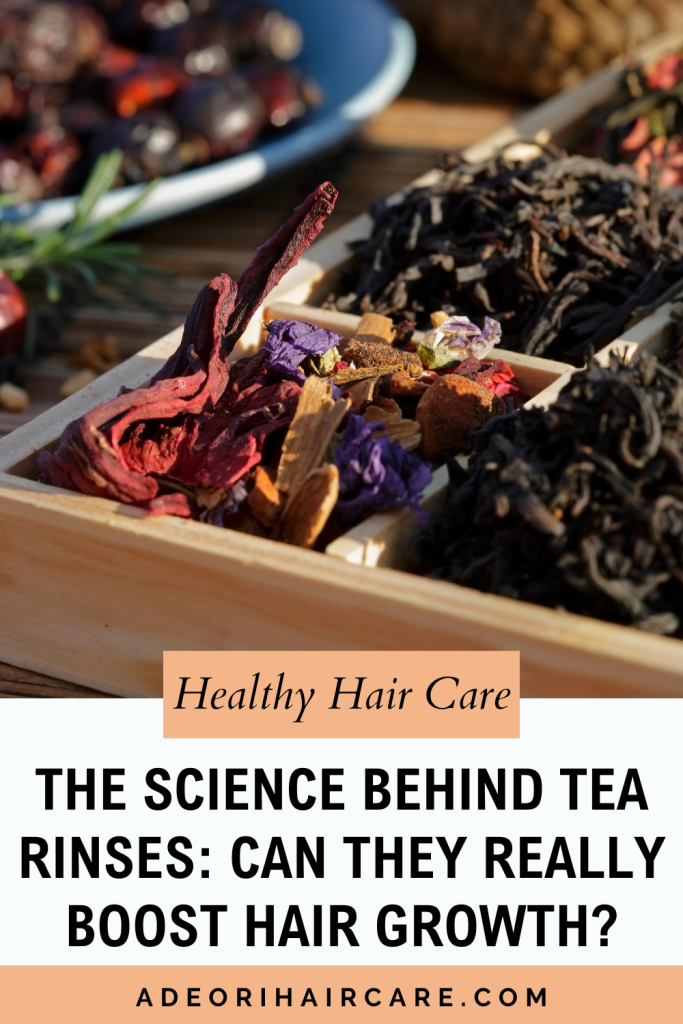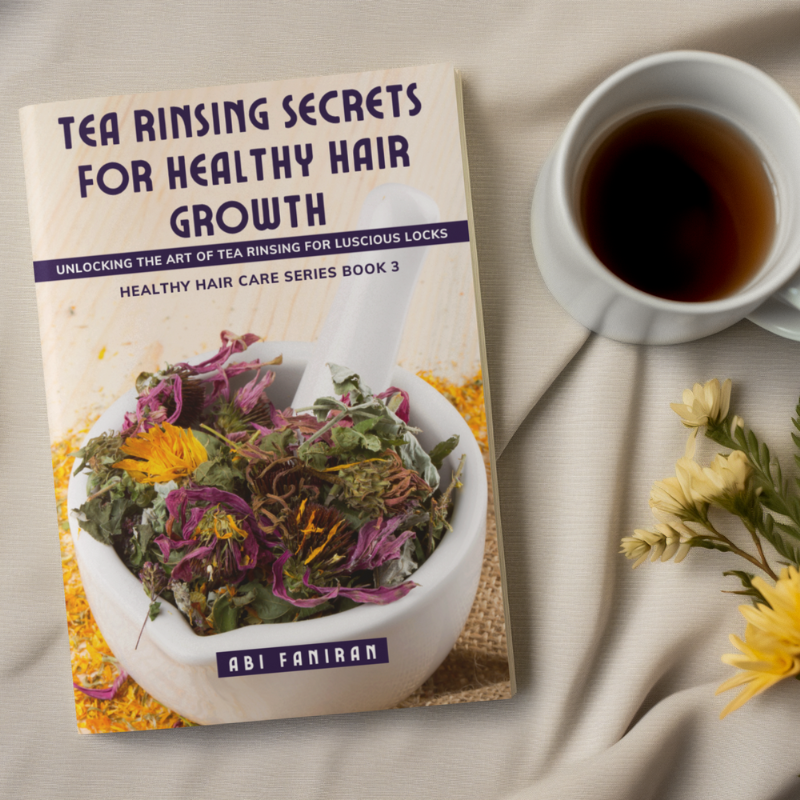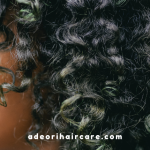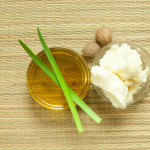Tea rinsing is a natural remedy for promoting hair growth, reducing shedding, and improving scalp health. It is a simple yet potent way to nourish and enhance your hair health.
But is tea rinsing another hair care trend, or is there real science behind tea rinsing for healthy hair growth?
Many DIY hair enthusiasts swear by green tea, black tea, and herbal rinses to strengthen strands, combat shedding, and stimulate hair follicles.
Indeed, it is the main focus of Healthy Hair Care Series Book 3, but how do tea rinses actually work?
In this article, we’ll dive into the science behind tea rinses, how they work, and whether they can really help boost hair growth.

What Are Tea Rinses?
A tea rinse is a herbal infusion used to rinse the hair after shampooing but before deep conditioning. Some tea rinses can also be used as a pre-poo, leave-in or even coloring hair.
Some of the most popular tea types used for hair rinses include green tea, black tea, and peppermint tea, but there are so many other types of tea that can be used for rinsing.
How Tea Rinsing Supports Hair Growth: A Quick Overview
Tea rinsing works because certain teas contain potent antioxidants, caffeine, and plant compounds that:
- Stimulate the scalp and improve blood circulation to hair follicles.
- Reduce hair shedding by blocking DHT, the hormone linked to hair loss.
- Strengthen hair strands by delivering key nutrients directly to the hair shaft.
- Soothe scalp irritation and reduce dandruff or inflammation.
Let’s break down the key components in tea that support healthy hair growth and scalp health:
1. Caffeine in Tea Rinses Stimulates Follicles
Caffeine in high concentrations in black and green tea can help stimulate hair follicles and promote longer, thicker hair.
The Science: A study published in the International Journal of Dermatology found that caffeine blocks DHT, the hormone responsible for hair loss while stimulating keratin production in hair follicles.
2. Antioxidants in Tea Rinses Optimizes Scalp Health
Green tea and herbal teas are rich in antioxidants like polyphenols, catechins, and flavonoids, which protect hair follicles from oxidative stress and damage.
The Science: Studies show that green tea polyphenols stimulate hair regrowth by prolonging the hair cycle’s anagen (growth) phase.
3. Tannins in Tea Rinses Reduce Shedding
Tannins found in black tea and herbal teas help tighten the hair cuticle, making strands smoother, stronger, and less prone to breakage.
The Science: Some research indicates that tannins create a protective barrier around hair strands, reducing protein loss and strengthening hair structure.
4. Anti-Inflammatory Benefits for the Scalp
Many herbal teas contain anti-inflammatory and antifungal properties that reduce dandruff, itching, and scalp irritation.
Chamomile, peppermint, and rosemary tea are especially beneficial for soothing the scalp and relieving itchiness.
Are There Any Side Effects of Tea Rinsing?
Tea rinses are safe, but overuse can lead to dryness, straw-like hair, or protein overload for some hair types.
Tea Rinsing Secrets for Healthy Hair Growth: Unlocking the Art of Tea Rinsing for Luscious Locks has over 30 types of tea for tea rinsing, full recipes, application methods, troubleshooting tips, and more.

Conclusion on Tea Rinsing for Boosting Hair Growth
Science supports that tea rinses can stimulate hair growth, reduce shedding, and improve scalp health.
They are a natural, easy, and cost-effective way to support hair and maintain scalp health.
Incorporating tea rinses into your hair care regimen may boost your chances of naturally growing long, healthy hair.
The key is using the right teas and recipes for your hair needs and applying it correctly.
Consistency is also essential, as well as tracking results to find what works best for you!
Start your tea rinsing journey with Tea Rinsing Secrets for Healthy Hair Growth HERE.
What’s your favorite tea for hair? Have you tried tea rinsing before? Share in the comments section. I’d love to hear about your experience.
References
- Effect of caffeine and testosterone on the proliferation of human hair follicles in vitro
- Human hair growth enhancement in vitro by green tea epigallocatechin-3-gallate (EGCG) (Kwon et al., 2007).
- Natural alternatives from your garden for hair care: Revisiting the benefits of tropical herbs.
Abi is the founder behind Ade Ori Hair Care and the Healthy Natural Hair Products ecosystem, a platform trusted by women seeking clean, effective solutions for textured hair. With over 10 years of hands-on experience, she combines research-backed insight, ingredient transparency, and natural formulations to help women nourish their curls from the inside out. She’s passionate about empowering women through DIY tools, holistic hair education, and a community-first approach. Learn more here.




